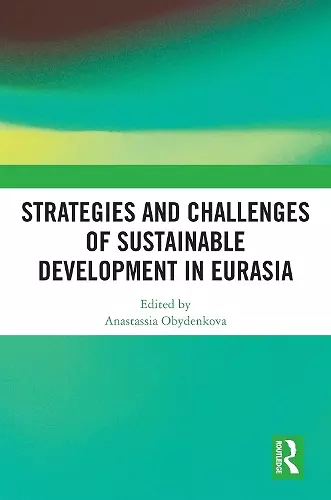Strategies and Challenges of Sustainable Development in Eurasia
Format:Hardback
Publisher:Taylor & Francis Ltd
Published:30th Apr '24
Currently unavailable, and unfortunately no date known when it will be back

This book examines the main environmental challenges and their management in post-Soviet Eurasia and China. It uncovers international, national, and subnational dimensions in sustainable development and aims to facilitate understanding of pressing environmental problems in the region.
While supporting the values and goals of sustainable development at the international level, states might employ very different strategies at the national, regional and local levels. The goal of this edited book is twofold. First, it aims to advance our understanding of different strategies, paying special attention to China and Russia at global, national, and sub-national levels. Thus, analysis of their strategies across different levels presents a more rounded picture. The second goal is to identify at least a few of the most pressing challenges of sustainable development across post-Soviet Eurasia and China (e.g. nuclear supply chain, emissions, environmental conflict management) and to attempt to understand their triggers, outcomes, and potential solutions. This book reflects the state-of-the-art before the invasion in Ukraine took place. It aspires to develop a better dialogue across different sets of literature in area studies, environmental politics, and international relations to improve our understanding of obstacles to sustainable development in Eurasia.
The chapters in this book were originally published as a special issue of Post-Communist Economies.
What happens in Eurasia will have enormous implications for the global fight to mitigate climate change. This set of essays does a great job helping us understand the evolution of events in these countries and how they are likely to respond to the need to make a green transition. The analysis makes a large contribution by combining a clear-eyed understanding of the political processes with a focus on important environmental drivers such as the nature of the energy systems in Russia and China.
Robert Orttung, Research Professor of International Affairs, George Washington University (USA)
“The issue of environmental governance in Eurasia is an area that has for too long been neglected by policymakers and even overlooked by scholars of the region, lost under the more pressing issues of authoritarian leadership and economic transition. This volume rectifies this neglect with a fascinating series of chapters addressing the environmental challenges that the region faces – and, critically, how the governance aspect of environmental management is being addressed. Covering China, Russia, and the states of Central Asia, this book should be required reading for understanding approaches to sustainability in the Eurasian landmass.”
Christopher A. Hartwell. Professor of International Business Policy, ZHAW School of Management and Law (Switzerland)
Environmental depredation was one of the many scarring legacies of Communist rule in the former Soviet Union. From a variety of perspectives, the authors examine how Russia and other former Soviet republics have sought to reduce hydrocarbon emissions but have made only faltering progress at best. The book covers Central Asia and Russia in particular depth and also features valuable coverage of protest movements against environmental waste around nuclear sites --- movements that began to arise during the late Soviet era and that have continued to functino since 1991, albeit with mixed results. The book also does an admirable job of comparing Russia, by far the largest Soviet successor state, with China, a country that is still a Communist autocracy. The similarities and contrasts between these two cases are fascinating.
Mark Kramer, Director of Cold War Studies, Harvard University (USA)
ISBN: 9781032704074
Dimensions: unknown
Weight: 453g
164 pages